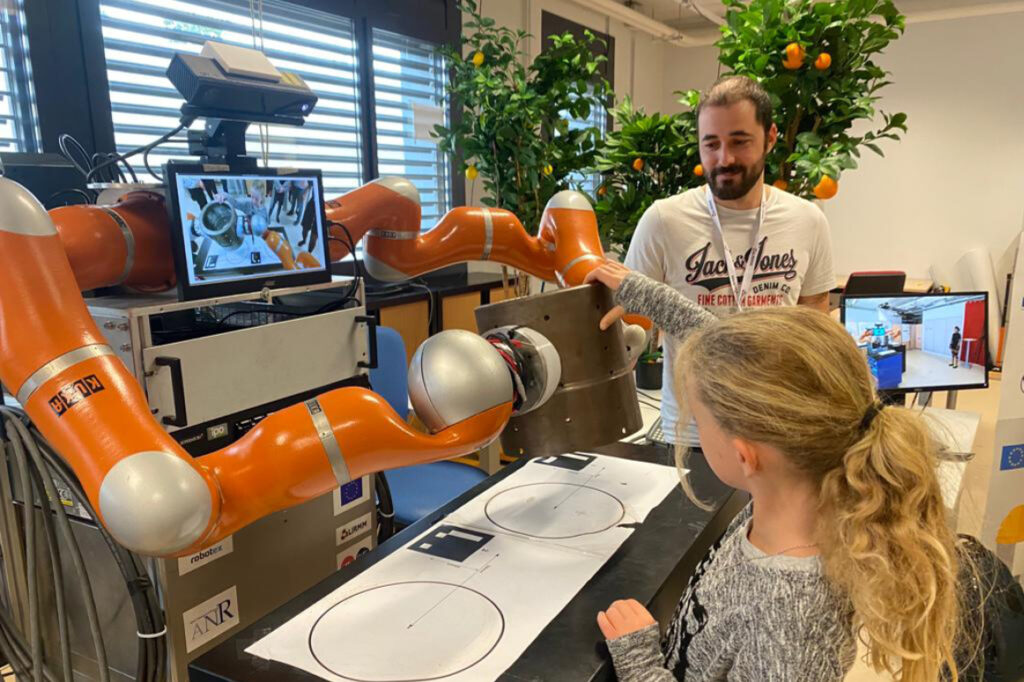30 years of innovation with LIRMM
Created in 1992, the Montpellier Laboratory of Computer Science, Robotics, and Microelectronics, better known as LIRMM, celebrated its 30th anniversary this year. This was an opportunity to look back with Philippe Poignet, its director, on the countless innovations that, thanks to the commitment of researchers, have gone beyond the walls of the labs to be put to good use in fields as diverse as they are surprising.

"When I arrived in the early 2000s, LIRMM already enjoyed national and international renown. In our field, there were few laboratories as large as this one, bringing together so many disciplines," recalls the man who would become its director 15 years later. But at the time, Philippe Poignet was a young robotics researcher who had just arrived on the St Priest campus, built in 1992 to house, among other things, this new laboratory resulting from the merger between CRIM (Montpellier Research Center) and LAMM (Montpellier Automation and Microelectronics Laboratory).
Initiated by Christian Durante and his team, including Michel Chein, this new structure, named LIRMM, has been headed by Gaston Cambon since 1992. Initially, four departments were created, which quickly became three: the computer science department, comprising 15 research teams, including one shared with the robotics department; the robotics department, which now has four teams; and the microelectronics department with its three teams. In total, more than 400 people, including 160 researchers, Professors teacher-researchers of 40 nationalities, all contribute to making this laboratory one of the forefronts of innovation at the University of Montpellier.
Serving human beings
Emblematic and fascinating, robotics is naturally the subject of dreams and fantasies for the general public. Several specialties coexist within LIRMM, starting with humanoid robotics and more specifically cobotics, i.e., human/robot interaction. A report in the podcast A l'UM la science gave Robin Passama and Benjamin Navarro the opportunity to present their work on collaborative robots capable of assisting humans in simple tasks. Another specialty of the department is underwater robotics, notably the famous archaeological robots (Des robots en eaux profondes) by Vincent Creuze, winner of the 2022 Innovation Award from the University of Montpellier.
Surgical robotics is also at the heart of the robotics department's work. Here, progress is being made in eye surgery with Acucurgical, the start-up founded by Philippe Poignet and Yassine Haddab; reconstructive surgery for severe burn victims with Dermarob and, more recently, a new robot developed with the Lyon-based start-up LabSkinCreations; urology with Ily (Sterlab), an assistance robot for the treatment of kidney stones; hip and knee surgery with MedTech (now Zimmer-Biomet).
Over the past 30 years, many LIRMM projects have left the laboratory walls, and for Philippe Poignet, one of them has had a particularly significant impact on his career: "In terms of commercialization, it's the Quattro robot (ADEPT), a parallel robot designed by François Pierrot with the Spanish foundation Fatronik (now Technalia)."
Reliability and energy above all else
"On the electronics side, we focus on testing and reliability of integrated circuits and on designing adaptive embedded systems. These systems are designed to be energy efficient," explains the director of LIRMM. This field is less well known to the general public, but Laurent Latorre, head of the microelectronics department, kindly introduced us to it in a report broadcast on A l'UM la science on September 22.
And here again, there is no shortage of examples of valued innovations: Algodone, a start-up specializing in securing connected objects (A secure bridge to your connected objects) developed by Lionel Torres, a researcher at LIRMM and director of Polytech; NinjaLab, founded by Victor Lomné and Thomas Roche, the pros at La cryptanalyse étoilée; Néocéan and their technological wave that combines a love of the sea with microelectronics; and the magicians at Neurinnov, David Andreux and David Guiraud, whom we met in the video series Décollage to talk about their implantable medical devices capable of restoring sensation in amputees...
Interdisciplinarity as the laboratory's DNA
With fifteen teams at work, the IT department is undoubtedly the largest department at LIRMM, bringing together a wide range of specialties, as Alexandre Pinlou, IT researcher and deputy head of the department, explained in a report broadcast on October 6. "There are major topics related to data science, artificial intelligence and learning, software engineering, and more," describes Philippe Poignet. These major topics encompass countless specialties: bioinformatics, natural language processing, statistical and symbolic learning, knowledge representation, ontologies, reasoning, image analysis and processing, and more.
These are all fields in which LIRMM researchers have been innovating continuously for 30 years. "This innovation has very often been achieved in collaboration with other disciplines, an approach that is truly at the heart of our motivation. We are convinced that we have a real role to play in advancing biology, health, ecology, and the environment, and Montpellier is rich in this diversity. " And here again, there is no shortage of examples, whether it be the recent work of bioinformatician Eric Rivals on brain cancer, the tracking of bluefin tuna with Popstar (Conserving bluefin tuna) or the monitoring of epidemics with PhyML (Dans la famille coronavirus je demande).
open days
And it was to show the general public the diversity of this work and its fields of application that the LIRMM opened its doors to the public for the first time in 30 years during the latest Science Festival. With exhibitions, stands, and demonstrations, several hundred people came to meet the researchers throughout the day. "It's true that our disciplines fuel many dreams and fantasies, and this day was an opportunity for us to show the reality of our expertise and our innovations. We all really enjoyed the day and, to be honest, we didn't expect such a successful response, " concludes Philippe Poignet. See you next year!